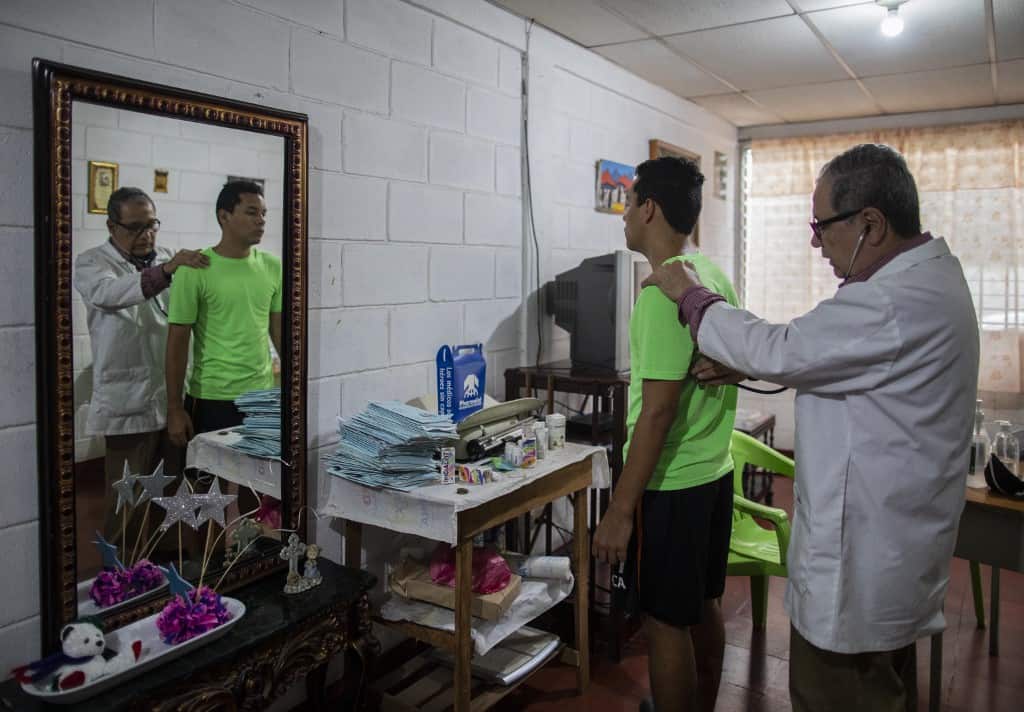Unemployed and emotionally worn, Nicaraguan doctors fired from the public health system for criticizing the government’s handling of the pandemic remain on the front lines, fighting COVID-19 with almost no resources.
“I turned my living room into an office,” Gustavo Méndez, a 61-year-old doctor, told AFP. “The cost of the consultation is based on the means of the people; sometimes I don’t charge.”
“I attend to COVID-19 (patients) by phone, according to the protocols established for each phase of the disease,” he explained. His service does not include treatment or high-cost exams, which must be covered by the patient, said Méndez, who has more than 30 years of experience.
“I have recovered three COVID-19 patients, two 40-year-olds and one 83-year-old,” says the doctor, who had specialized in pediatric hematocytology in Spain and Italy.
Méndez is one of more than 15 doctors who were fired from the public health system after complaining about the lack of protective equipment in hospitals and asking that the government of President Daniel Ortega enact measures against the pandemic.
Firing the doctors was controversial amid the expansion of COVID-19 in a country of 6.2 million inhabitants, with a public health system whose hospitals are “collapsed,” according to medical associations.
In addition, reports indicate dozens of doctors and health workers have been infected with COVID-19.
The medical community has been shaken by coronavirus deaths, including two doctors from the same family in the city of León who became infected when caring for patients at home.
The government’s measures to contain the virus are “a little weak,” according to Méndez.
“They never give real data on the pandemic, and doctors are prohibited from putting COVID-19 on death certificates; they must put atypical pneumonia or any other cause,” he said.
This week, the Ministry of Health announced 2,519 infections and 83 deaths. Meanwhile, the Citizen Observatory, a network of doctors and other members of civil society, reports 6,775 cases and 1,878 deaths suspected or associated with the pandemic through June 24.
The dismissal from the hospital where Méndez worked for many years impacted him.
“At a certain moment, it gave me a little depression and insomnia,” he said. “It was retaliation.”
In his grief, Méndez found motivation in the words of the late former US President John F. Kennedy: “Ask not what your country can do for you; ask what you can do for your country.”
“That has helped me remove my fear and start the fight; this is like a challenge,” he said.
Telemedicine as an alternative for care
By using remote medicine, doctors fired in the midst of the pandemic offered free care to people with limited resources or who are avoiding hospitals for fear of contagion.
Carlos Quant, one of the first doctors to be fired from the public system for criticizing the government’s handling of the pandemic, currently spends his time working in a private clinic and offering health services over the phone.
“As an infectious disease specialist, I support colleagues in the management of some patients, in addition to giving medical advice through social networks,” Quant said.
Maríanela Escoto, who was also fired, is still analyzing what her next steps will be.
“It was something unexpected when they gave me my dismissal letter,” she said. “It was a hard blow to my job stability, emotions, to my routine of having a stream of patients in the operating room.”
“I have no other desire than to be a doctor. That’s why I had decided to work in the public health system: to pay back the people of Nicaragua with care.”






